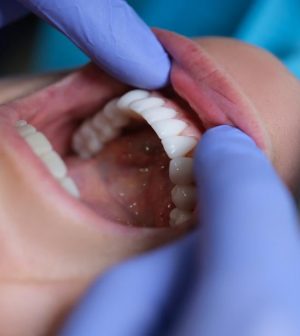- Could Your Grocery Store Meat Be Causing Recurring UTIs?
- Are You Making This Expensive Thermostat Error This Winter?
- Recognizing the Signs of Hypothyroidism
- 10 Strategies to Overcome Insomnia
- Could Artificial Sweeteners Be Aging the Brain Faster?
- Techniques for Soothing Your Nervous System
- Does the Water in Your House Smell Funny? Here’s Why
- Can a Daily Dose of Apple Cider Vinegar Actually Aid Weight Loss?
- 6 Health Beverages That Can Actually Spike Your Blood Sugar
- Treatment Options for Social Anxiety Disorder
Scientists Identify Genes That Shape People’s Teeth

Ever wonder why your teeth look the way they do?
A group of genes drive the shape of each person’s teeth, including at least one gene inherited from Neanderthals, a new study published Dec. 12 in Current Biology found.
There are 18 sets of genes that influence the size and shape of teeth, 17 of which had not been previously linked to tooth development, researchers reported.
This includes a gene believed to be inherited from Neanderthals due to interbreeding with ancient humans.
“We have now identified numerous genes that impact the development of our teeth, some of which are responsible for differences between ethnic groups,” researcher Kaustubh Adhikari, a statistical geneticist with the University College London, said in a news release from the university.
These genetic revelations help inform scientists’ understanding of human evolution, but they’ll also potentially contribute to better dental health, said lead researcher Qing Li, a postdoctoral researcher with Fudan University in China.
“Some of the genes that contribute to the normal variation of tooth dimensions among healthy people can also contribute to pathogenic variation, such as teeth failing to grow in or other dental health conditions,” Li said.
“We hope that our findings could be useful medically, if people with particular dental problems could undergo genetic tests to help in diagnosis, or if some dental anomalies could be treated one day with gene therapies,” Li added.
For the study, researchers analyzed data from nearly 900 volunteers in Colombia of mixed European, Native American and African ancestry.
The data included dental crown measurements derived from 3D scans of dental plaster casts taken from the participants, which researchers compared with each person’s genetic information.
The Neanderthal gene variant linked to teeth was only found in people of European descent, researchers said. Carriers of the variant have thinner incisors, the eight teeth at the front of the mouth that are best at biting into food.
Another gene known to impact incisor shape in East Asian people, EDAR, also appears to influence the width of teeth in all humans.
Overall, people of European descent also had smaller teeth, researchers noted.
“Our findings did not shed light on whether the genes that identify tooth shape were selected in evolution due to particular advantages to dental health, so it’s possible that the genes may have been selected due to the influences they have in other areas, with tooth shape differences resulting as a side effect, said researcher Andres Ruiz-Linares, a professor of human genetics with University College London.
More information
The American Dental Association has more about genetics and oral health.
SOURCE: University College London, news release, Dec. 12, 2024
Source: HealthDay
Copyright © 2026 HealthDay. All rights reserved.










